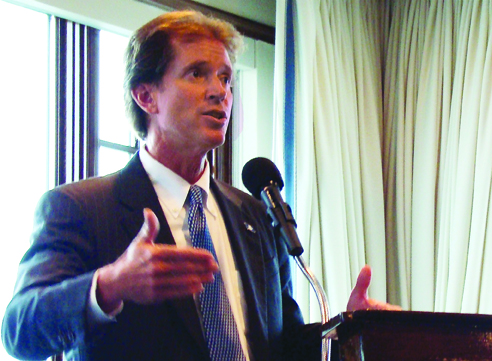Deep-sixed

Connecticut plummeted on an index of economic competitiveness with its 44th ranking two slots behind New Jersey, but ahead of last-place New York.
In the annual “Rich States, Poor States” study sponsored by the American Legislative Exchange Council, economist Arthur Laffer ranks states according to taxes, regulatory burdens and labor policies, among other criteria. In the ALEC report, Laffer takes especial aim at Connecticut”™s gift and estate tax, contrasting it with states such as Ohio that voted to repeal death taxes.
“Some small businesses may be rich in assets, but lack cash, meaning that they must sell off their assets in order to pay the tax,” Laffer wrote in the report. “As in other states with a high death tax, successful Ohioans are tempted to leave town to save their families a large tax bill.”
Connecticut Gov. Dannel P. Malloy”™s budget lowered the tax threshold from $3.5 million of taxable assets to $2 million, retroactive to January 2011, and kept the rate at 12 percent.
Greenwich state Sen. Scott Frantz introduced a bill this session to repeal the gift and estate tax, but at deadline the legislation remained buried in the joint committee on finance.
Through March for the fiscal year ending this June, inheritance tax collections are down more than 40 percent in Connecticut, to $12.3 million.
While gift and estate taxes can fluctuate due to a few wealthy residents dying, triggering the tax for a given tax year, some say collections could drop due to rich people re-establishing residency in a tax-free jurisdiction such as Florida.
Not all are convinced.
“The reality is that it doesn”™t happen,” said Lori Pelletier, secretary and treasurer of the Connecticut AFL-CIO. “Some may go for other reasons. The idea of moving to a southern state in the middle of January has nothing to do with how much money is in your bank account. It has to do with what the temperature ”¦ is when you get in your car in the morning and its single digits.”
But that sentiment ignores a simple fact ”“ for snowbirds hypothetically spending October through March in Florida, tacking on an extra month to their winter sojourn is all it takes to establish residency there and so avoid Connecticut inheritance taxes. It is not much.
The appeal of some southern states goes well beyond death taxes, according to Fred Carstensen, director of the Connecticut Center for Economic Analysis at the University of Connecticut.
“Brian Flaherty, who works with Nestle Waters, explained in Virginia they”™ll install some of your production equipment and train workers,” Carstensen said. “They are absolutely ready to walk in to your factory fully trained. There”™s no capacity to do that kind of thing in Connecticut.”
Speaking in Hartford last month, the owner of Stamford-based Optul Global Services recalled consulting to the Connecticut Department of Economic and Community Development three years ago on the trend of U.S. corporations swiftly shipping production capacity to Asia and other regions.
“I recall looking at the people in economic development, with them looking somewhat puzzled and really uncomfortable with the idea that they were confronting a new challenge that they had not heard of before,” Pollard said. “Based on that experience alone, I walked away understanding that what we would need to do in government is to have a quicker ”˜refresh”™ in terms of what is going on within the corporate enterprise.”